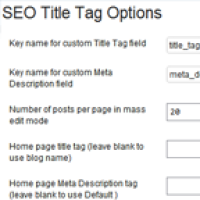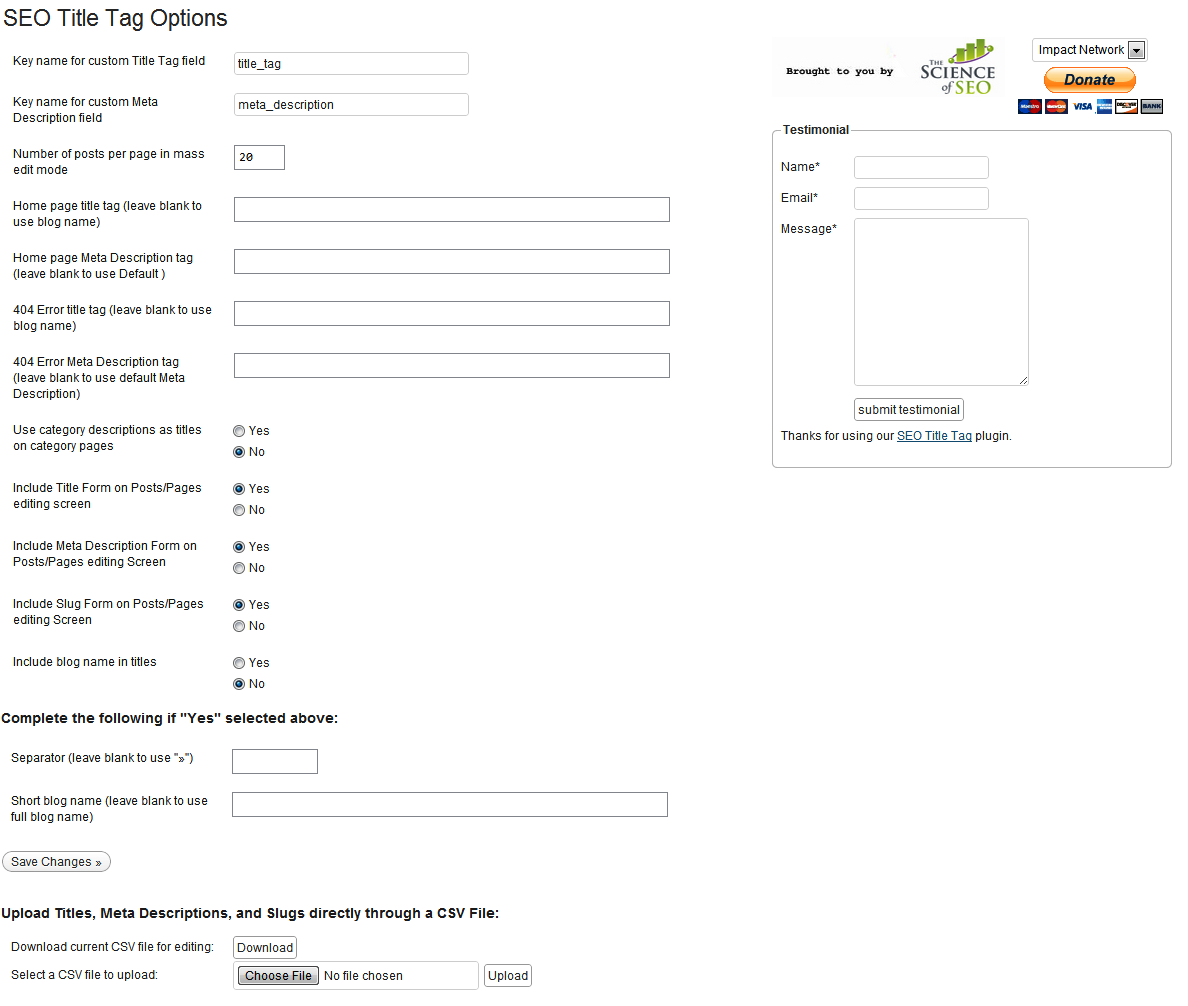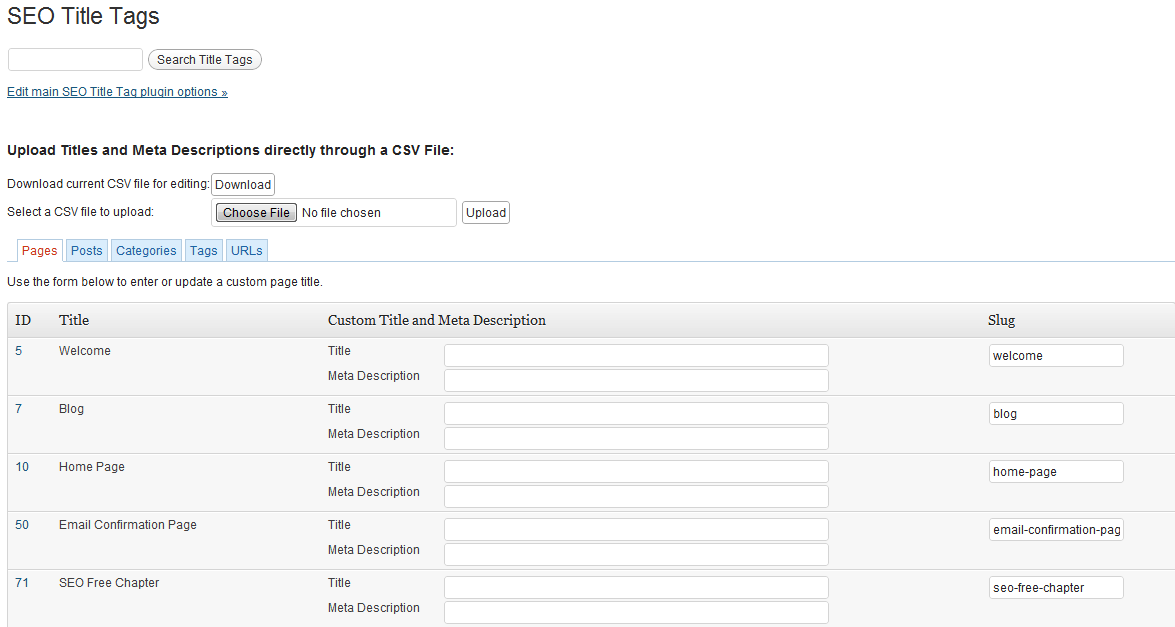
Title tags are arguably the most important of the on-page factors for search engine optimization (“SEO”). It blows my mind how post titles are also used as title tags by WordPress, considering that post titles should be catchy, pithy, and short-and-sweet; whereas title tags should incorporate synonyms and alternate phrases to capture additional search visibility.
Now, thankfully, there is a solution, allowing you to decouple post titles from title tags. Introducing… the SEO Title Tag 3.0 WordPress plugin. With version 3.0 we have added the ability to mass edit meta descriptions and slugs on top of the original title tag editor!
SEO Title Tag makes it dead-easy to optimize the title tags, meta descriptions, and slugs across your WordPress-powered blog or website. Not just your posts, not just your home page, but any and every title tag, meta description, or slug on your site! If this plugin, along with a little keyword research and copywriting of optimized titles, doesn’t make a significant impact on your search traffic, you’re doing something wrong!
SEO Title Tag is authored by SEO specialist Stephan Spencer. Version 2.0 was a collaborative effort — Stephan did the concept development and Oliver Kastler, Mike Harding and Elton Fry did all the heavy lifting. Andrew Shell took over development responsibilities from versions 2.1-2.3.3. For our latest, and most exciting launch, we have recruited the help of Zapbuild. SEO Title Tag 3.0 is completely free and has been released as “open source” under the GPL license. So enjoy!
Features include:
- Allows you to override a page, post, category, tag, or url’s title tag, meta description, and slug with your own custom entry.
- Mass editing of title tags, meta descriptions, and slugs for all posts, static pages, category pages, tag pages, tag conjunction pages, archive by month pages, — indeed, any URL — all in one go.
- Define a custom title tag and meta description for your home page (or, more accurately, your Posts page, if you have chosen a static Front Page set under Options -> Reading), through the Settings -> SEO Title Tag page in the WordPress admin.
- Define the title tag and meta description of 404 error pages, also through Settings -> SEO Title Tag.
- The ability to upload titles, meta descriptions, and slugs directly through a CSV file, making mass editing even easier!
- Title tags of category pages can optionally be set to the category description. If you use a Meta Tag plugin like Add Meta Tags, then you should not use this feature and instead let the Meta Tag plugin use the category description for the meta description on category pages.
- If you choose to keep the blog name in your title tags (not recommended!), the order of the blog name and the title are automatically reversed, giving more keyword prominence to the title instead of the blog name. Note there is also an option to replace your blog name with a shorter blog nickname.
And best of all, the plugin is FREE!
Suitably convinced? Then Download the plugin ! Download the plugin
Like what you see? Rate this plugin at WordPress.org
Screenshots
– Tools Page
Installation and operation instructions
- (If upgrading from a prior version of SEO Title Tag, be sure to deactivate the old version beforehand.)
- Upload the seo-title-tag directory and the files within it to your wp-content/plugins directory.
- Activate the plugin.
- Configure the settings under Settings -> SEO Title Tag. You’ll want specify a title tag for your home page which will override your blog name as the home page’s title tag and specify a title tag for 404 error pages. You can also configure here whether you want all the rest of your site’s title tags to have your blog name, or a shortened version of your blog name, or neither, appended to the end. IMPORTANT: You must save the settings, even if you haven’t changed them from their defaults, in order to ensure that the title tags for Posts and for Pages works properly.
- For those of you with a static Front Page chosen under Settings -> Reading, the “home page” described in the point above is actually the Posts page, and as such, the SEO Title Tag options page will actually will say “Posts Page” instead of “Home Page” — because it detects that you have selected a static Front Page. In such a scenario, in order to also customize the Front Page’s title tag, specify a Title Tag on that page’s Edit Page form, or within Tools -> Title Tags -> Pages.
- Define custom title tags, meta descriptions, and slugs for your existing posts, static pages, category pages and tag pages in the admin under Tools -> Title Tags.
- When writing a new post/page, define a title tag, meta description, and slug by typing something into the respective fields. If you’re happy to use the defaults, then you can leave them blank.
To learn more about search engine optimizing your WordPress blog, you’ll probably want to read Stephan Spencer’s 10 tip series on Blog SEO.
To-do
- add some more text to the titles of tag pages globally. They are using the same divider as used for posts, and really there should be an option to add something like “Tag | Posts Related to Tag | Blog Name”
Feedback?
Got a bug to report? Or an enhancement to recommend? Or perhaps even some code to submit for inclusion in the next release? Great! Share your feedback with the author, Stephan Spencer, either below or on his blog at this post.
UPDATE: 2.0beta2 has some important bug fixes, including the issue where Options weren’t updating and the Manage > subtab wasn’t displaying.
UPDATE: 2.0beta3 has more important bug fixes, including the issue where MySQL tables were sometimes not being created, and PHP tags weren’t all consistently starting with <?php but instead the <? shorthand which doesn’t work on some server configurations.
UPDATE: 2.0beta5 has more fixes for MySQL issues some folks were having. Also fixed a IIS server incompatibility issue.
UPDATE: 2.0beta6 fixes a problem where some folks were seeing a “No Posts Found” message under Manage -> Title Tags -> Posts even though the blog has posts. And it fixes a problem for users of WordPress version 2.0.5 and earlier, where titles on category pages weren’t showing up due to an undefined function attribute_escape (a new function introduced in WordPress 2.0.6).
UPDATE: 2.0beta7 fixes a problem with the page number sometimes appearing on static pages and a problem with a MySQL error on the Manage > Title Tags > Posts page.
UPDATE: 2.0RC1 fixes categories showing a warning if there are no category title tags set; Manage Posts filtering out everything thats not a post (images, pages). Also added and tested fix for menu links (“edit.php”).
UPDATE: 2.0RC2 fixes a problem with backslashes appearing before apostrophes.
UPDATE: 2.1.0 adds WordPress 2.3 compatibility.
UPDATE: 2.1.1 fixes bug where old title tags for UTW tag pages weren’t being imported. Also fixes WordPress 2.3 bug of not displaying page titles for tag intersections and unions correctly.
UPDATE: 2.1.2 fixes display issues with international characters.
UPDATE: 2.1.3 fixes issue with extra slashes being added. Also adds Nonce support for extra security.
UPDATE: 2.3.0 updates the layout to display better in the new WordPress admin.
UPDATE: 2.3.1 fixed an issue where in WordPress 2.6.1 saving a post/page creates multiple title_tag custom fields.
UPDATE: 2.3.2 fixed an issue where if you were using nested pages (the parent functionality) fields might not show up on the mass edit screen.
UPDATE: 2.3.3 fixed an issue with the tabs not working on WordPress 2.7 and ideally some issues with updates not sticking on the mass edit page.
UPDATE: 3.0 added the major functions of the ability to mass edit meta descriptions and slugs. We also added WordPress 3.4.2 compatibility a character counter for title tags and meta descriptions, the ability to upload tags through a CSV file, and removed the necessity for users to replace text in the theme editor.
Tell Your Friends!
Tweet
About the Author
This plugin was developed by SEO specialist, Stephan Spencer. You can read more at Stephan’s website.
Tags: Optimization, SEO, Title Tag, Title Tag Plugin, Tools, WordPress Plugin


Leave A Reply (17 comments so far)
WordPress Title Tag Plugin…
I told you they were on the ball. Stephan has just announced the new version of the WordPress SEO Title Tag Plugin developed by himself and the developers at Netconcepts. Very sweet…installing right now.
……
What versions of WordPress is it compatible with ?
Sweet plugin, I’ve been using it and although I don’t know what hockey stick graphs are I’ve definitely noticed improvements in rankings for terms I can now focus on in the title tag. Just wondering if I will lose my existing title tags if I upgrade to 2.0 beta?
This is pretty cool! One of my friends was just recently complaining about lack of options for this very thing…
[…] duplicate enough to trigger content filters? So I followed Jill’s advice and installed the title tag plugin from Stephan Spencer at Netconcepts (which has had a recent release). This alone had significant […]
My question, Bruce, would be why would you want the other plugin ( the RSS feed scraper ) on your blog ?
How could there be a choice between the two ?
One will definitely improve the rankings of all the unique content you write and the other will show people what other people write, which you should only be doing thru links and Trackbacks.
No real choice here.
Wow! Really nice plugin! Cool, thanx!
This is a GREAT plug in! I love the interface b/c it makes it so easy to use and implement. Amazing job!
What a fantastic plug in you are right the title tag is very important. People need to remember to only use 65 words (including spaces) and include your main keyword(s)
Title tags are a lot more important than people give them credit for, so much so that Matt Cutts recently devoted a podcast to the subject.
Can’t do much on blogger,
Can’t even completely remove nofollow on it. But blogger allow user to target ads on their blog. Wish WordPress do the same for free member in future. Will they do that?
At last focus is moving away from the keyword tag, although it is said that there are uses as far as Yahoo is concerned for using it to target mis-spelt keywords
Stephan you are right, it is a small thing that goes missing on most people.
By changing the title tag, h1, alt tags and a few words in the content, the whole structure of a website changes
I am trying to add a title tag to post pages that is more dynamic. Basically I want [title] – [tag name] | site name. I can’t get the name of the tag that I use to display in the posts title tag. Any suggestions?
I would advise caution on dynamic title tags – I had heard that Google takes a dim view of these. Am I right with this – can anyone with more knowledge elaborate on this?